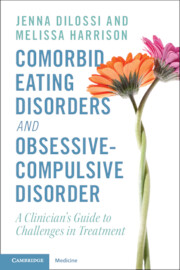 Comorbid Eating Disorders and Obsessive-Compulsive Disorder
Comorbid Eating Disorders and Obsessive-Compulsive Disorder Book contents
- Comorbid Eating Disorders and Obsessive-Compulsive Disorder
- Comorbid Eating Disorders and Obsessive-Compulsive Disorder
- Copyright page
- Contents
- Foreword
- Preface
- Acknowledgments
- Abbreviations
- Part I Overview of the Existing Literature
- Part II Clinical Pitfalls and Treatment Failures
- Chapter 7 Underweight and Malnourished Patients
- Chapter 8 Provider Collaboration in Eating Disorder Treatment
- Chapter 9 Impact of Eating Disorder Treatment on Obsessive-Compulsive Symptoms
- Chapter 10 The Relationship between Eating, Distress Tolerance, and Emotion Regulation in Obsessive-Compulsive Disorder
- Chapter 11 Poorly Executed Exposures
- Chapter 12 Considerations for Exposure Therapy in Eating Disorder Treatment
- Chapter 13 Subclinical Features as Treatment Barriers
- Part III Evidence-Informed Considerations for Assessment and Treatment
- Part IV Special Topics and Future Considerations
- References
- Index
Chapter 7 - Underweight and Malnourished Patients
from Part II - Clinical Pitfalls and Treatment Failures
Published online by Cambridge University Press: 14 December 2023
- Comorbid Eating Disorders and Obsessive-Compulsive Disorder
- Comorbid Eating Disorders and Obsessive-Compulsive Disorder
- Copyright page
- Contents
- Foreword
- Preface
- Acknowledgments
- Abbreviations
- Part I Overview of the Existing Literature
- Part II Clinical Pitfalls and Treatment Failures
- Chapter 7 Underweight and Malnourished Patients
- Chapter 8 Provider Collaboration in Eating Disorder Treatment
- Chapter 9 Impact of Eating Disorder Treatment on Obsessive-Compulsive Symptoms
- Chapter 10 The Relationship between Eating, Distress Tolerance, and Emotion Regulation in Obsessive-Compulsive Disorder
- Chapter 11 Poorly Executed Exposures
- Chapter 12 Considerations for Exposure Therapy in Eating Disorder Treatment
- Chapter 13 Subclinical Features as Treatment Barriers
- Part III Evidence-Informed Considerations for Assessment and Treatment
- Part IV Special Topics and Future Considerations
- References
- Index
Summary
The treatment of underweight and malnourished individuals with eating disorders (EDs) and obsessive-compulsive disorder (OCD) poses unique challenges and considerations. Low weight and malnourishment have implications on symptom presentation, treatment course, and outcomes. Clinicians should consider the impact of malnourishment on organ systems, the importance of medical care in treatment, and dietary considerations for weight restoration. Restrictive eating disorders such as AN and atypical AN can lead to similar psychological effects of malnourishment even if not underweight. Current ED treatment programs consider all patients as having malnutrition effects due to their illness, regardless of BMI. Atypical AN often goes unnoticed, leading to reinforcement of disordered eating behavior. Chronic malnutrition and starvation can affect almost every major organ system and result in permanent damage or death if not addressed. Additionally, underweight or malnourished patients often have a lot of dietary needs and need a lot of calories for restoration, which can be complicated by OCD symptoms such as obsessionality and intolerance of uncertainty.
- Type
- Chapter
- Information
- Comorbid Eating Disorders and Obsessive-Compulsive DisorderA Clinician's Guide to Challenges in Treatment, pp. 50 - 58Publisher: Cambridge University PressPrint publication year: 2023


